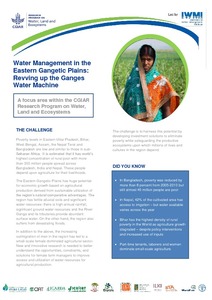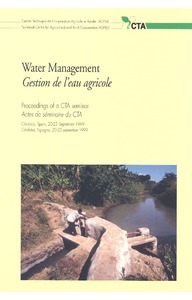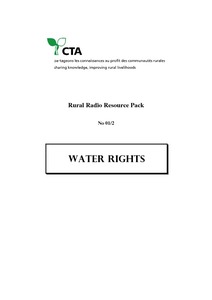gestão de recursos naturais
AGROVOC URI:
Water: the conveyor belt for sustainable livelihoods and economic development
Water Management: proceedings
With water availability being threatened in many parts of the world, improved water management has become urgent...
Water resource research and education in mountain communities
High elevation páramo (wetland) ecosystems in the Andes are important water sources for local communities and downstream agricultural and urban users. These headwater catchments, however, are often impacted by human activities (eg agricultural production) that affect both stream water quality and flow. Knowledge about water availability, quality, and use is essential for effective management but is often lacking, particularly in smaller mountain communities.
Water resources assessment of the Volta River Basin
The ‘WISE-UP to climate’ project aims to demonstrate the value of natural infrastructure as a ‘nature-based solution’ for climate change adaptation and sustainable development. Within the Volta River Basin, both natural and built infrastructure provide livelihood benefits for people. Understanding the interrelationships between the two types of infrastructure is a prerequisite for sustainable water resources development and management. This is particularly true as pressures on water resources intensify and the impacts of climate change increase.
Water Rights
The interviews in this pack explore a range of views on the meaning and value of the right to water. Some governments have included a right to water in their national constitution, but how meaningful is this?
What role can information play in improved equity in Pakistan’s irrigation system?: evidence from an experimental game in Punjab
The Indus Basin Irrigation System suffers significant inequity in access to surface water across its millions of users. Information, i.e., monitoring and reporting of water availability, may be of value in improving conditions across the basin, and we investigated this via an experimental game of water distribution in Punjab, Pakistan. We found evidence that flow information allowed players to take more effective action to target overuse, and that overall activities that might bring social disapproval were reduced with information.
Where the power lies: multiple stakeholder politics over natural resources: a participatory methods guide
This manual is a participatory methods guide (1) to assist those involved with multiple stakeholder situations or groups to appreciate and acknowledge the relevance and impact of micro-politics on stakeholder relations and resultant cooperative behaviour in these groups; (2) to provide a simple and systematic approach or framework to gather and analyse data on micro-politics among multiple stakeholders; (3) to highlight and offer practical suggestions for dealing with some of the methodological issues that influence gathering data on politics and relations among stakeholders; (4) to suggest
Whose waters? large-scale agricultural development and water grabbing in the Wami-Ruvu River Basin, Tanzania
In Tanzania like in other parts of the global South, in the name of 'development' and 'poverty eradication' vast tracts of land have been earmarked by the government to be developed by investors for different commercial agricultural projects, giving rise to the contested land grab phenomenon. In parallel, Integrated Water Resources Management (IWRM) has been promoted in the country and globally as the governance framework that seeks to manage water resources in an efficient, equitable and sustainable manner.
Watershed moments: a photographic anthology celebrating 30 years of research for a water-secure world (1985–2015 and beyond)
Windmills for pumping water
A new design of windmill under trial in Zimbabwe




